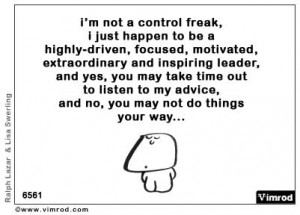 Symptoms of anxiety are determined by personality type. Control Freaks, like to be in control – it says so in the label, so how does anxiety affect their personality type and how do they create it?
Symptoms of anxiety are determined by personality type. Control Freaks, like to be in control – it says so in the label, so how does anxiety affect their personality type and how do they create it?
At the end of October, I wrote about Personality Archetype and anxiety. In it I sited the excellent book by Terence Watts titled Warriors, Settlers & Nomads and I would now like to look at each of the personality types in a little more depth, starting with Warriors, how their anxiety is created in the first place, how it tends to manifest itself and a top self help tip.
But, before I start – Control Freak is not a negative statement, more of a tongue in cheek view of the Warrior personality type and what happens to create anxiety and when it all goes wrong!
Control freaks are excellent at organising, getting things done, attention to detail, procedures and following instructions. They have natural leadership ability, make the best teachers and are at their best when making decisions, so it’s not a bad thing to be a control freak.
What causes anxiety for a Warrior? – well, we know it’s not situations or things which cause anxiety, especially for a warrior, in fact, in a crisis you would be thankful to have a warrior around you, they are the ones which will set up, take control and organise everyone in the midst of that crisis, so it’s not the crisis, but the way in which they are thinking about it which leads to problems.
When thinking positively a Warrior’s quick mind will evaluate the situation and come up with solution, weighing up the pros and cons in an efficient, strategic and calculated way, however, if thinking negatively, they will do the opposite and focus on the problem and, instead of working out what they can do, they will get frustrated at what they can’t do. The inability to take control and DO something will dominate their thinking, creating more frustration and anxiety, becoming the source of anxiety, resulting in trying to take control of something else, anything they can, particularly in their surroundings or environment. For control freaks, this can manifest itself in some of the obsessive compulsive disorders such as rituals around bed time, obsessive cleaning, germs and infection control, the need to have things done in a particular away and also often controlling people and their actions around them. Eating disorders such as anorexia, bulimia and compulsive eating are all forms of the eating template we’re all born with becoming distorted in the need to be in control of something.
The more the anxiety increases, the more restricting and controlling the behaviour becomes and, to the rational mind or other people this behaviour can seem irrational or even bazaar. The person involved often knows their actions don’t make sense and but will get fixated on controlling the problem and solving it, which they will never be able to do because a different way of thinking is needed.
Road rage is a typical control reaction of a warrior, getting angry about how other people are not driving correctly.
In children typical behaviours of the warrior personality are, again, about control, control of what they eat and control of their parents through a variety of means, for example, by manipulating their parents into taking part in their ritualised bedtime behaviours or the child ‘can’t’ sleep. Food made in a certain way or dominating the family meal times, making sure the parent cooks something special for them or they won’t eat it and having tantrums when they can’t get their own way. A child isn’t in control of much in their young lives, but they can always control what food they put in their mouth.
So, what can a control freak do to lessen the anxiety?
The first step is understanding and accepting its they way they are thinking about things in their own mind which is creating the anxiety in the first place. Warriors are very ‘right’ about things, they know what’s right and wrong, how things should be done and they don’t readily accept they are wrong or don’t know they answer, so it often takes them time to realise it is not about outside influences, instead it is coming from within and actually, that they can control.
Then, is gauging what aspects of the problem they can affect and breaking it down into small steps. Anxiety brings global thinking – all or nothing, so the thought patterns tend to be “there’s nothing I can do” or “it’s hopeless” or “everything has gone wrong”, but often that is not the case, there is usually something, however small, that can be done. This may be talking to someone, making a call, looking at the alternatives, considering different options, it may not be the solution, but it could start you down a road to a solutions.
Finally, acceptance. Acceptance of what you can’t control, just allowing it to be. Accepting that there are things you can’t control, accepting that you can’t control someone else’s thoughts or behaviours, so getting annoyed or frustrated that someone else isn’t doing something the way you would, is only going to cause YOU the anxiety, not them, they haven’t got a clue what you’re thinking.
When a warrior does make up his/her mind to take control of the anxiety being created from within, they are excellent at making changes and they are tenacious in their pursuit of making themselves well. But a warrior will not change their thinking because someone else has told them they should, they will only do it when they have come up with the idea to do it; when that happens, they can do anything they set their mind to and will quickly solve the problem, the time it takes, is the time spent in resisting change.
It’s not easy to change the way you think about things but solution focused hypnotherapy can help. Sometimes we can see change needs to happen, but don’t know where to start – that is the best time to see a hypnotherapist who will help you to make those changes from your own subconscious.

